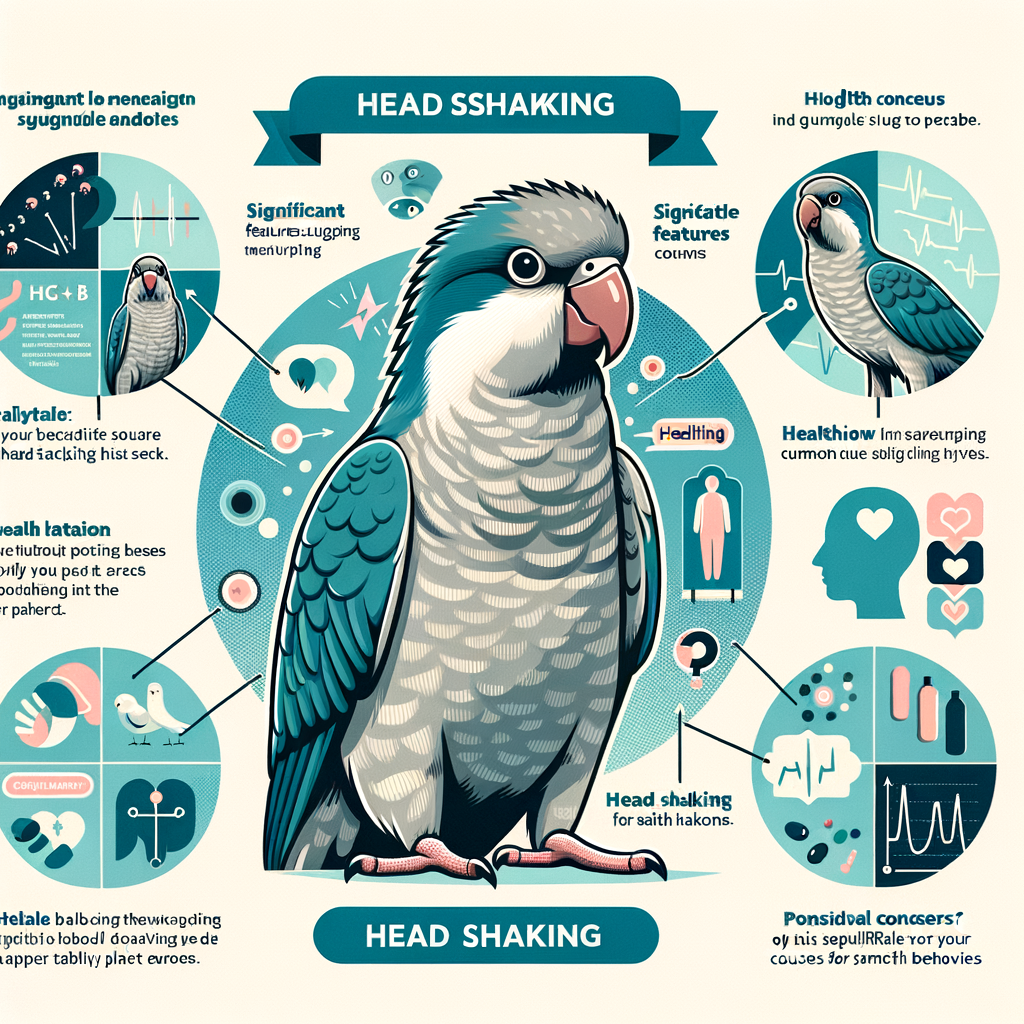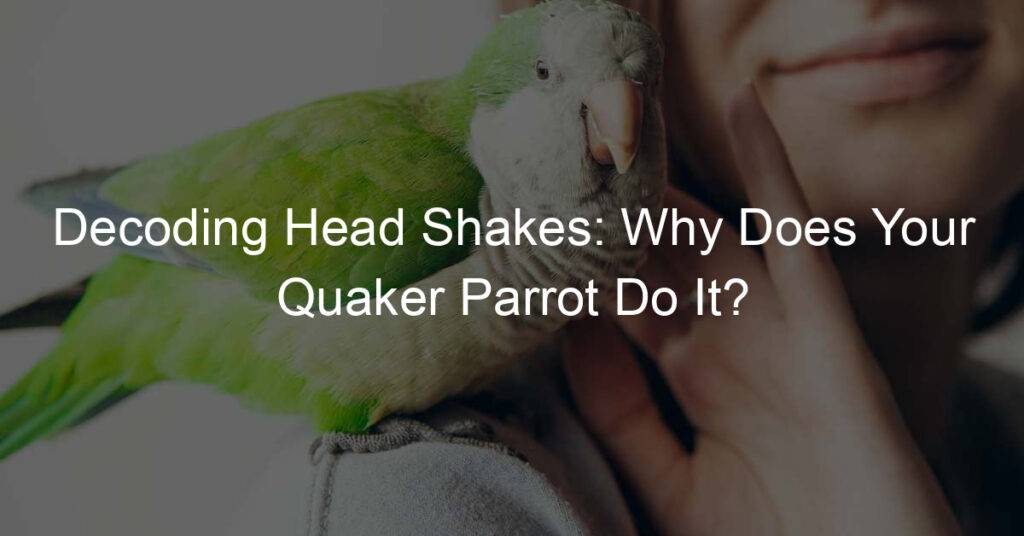
Introduction to Quaker Parrot Behavior
Quaker Parrots, also known as Monk Parakeets, are fascinating creatures with a unique set of behaviors. Understanding these behaviors can help us communicate better with these birds and provide them with the best possible care. In this section, we will delve into the world of Quaker Parrot behavior, exploring their actions, common behaviors, and body language.
- Understanding Quaker Parrot actions
- Common Quaker Parrot behaviors
- Quaker Parrot body language
Quaker Parrots are known for their lively and playful nature. They are highly social birds and enjoy interacting with their human companions. They express their feelings through various actions such as chirping, squawking, and flapping their wings. For instance, a happy Quaker Parrot may chirp melodiously, while a distressed one may squawk loudly. Observing these actions can give us insight into their mood and well-being.
Quaker Parrots have a range of common behaviors that they display regularly. These include preening, where they clean their feathers with their beak, and foraging, where they search for food. They also engage in play, using toys or interacting with their human companions. Quaker Parrots are also known for their ability to mimic human speech, which is a form of social interaction for them. Understanding these common behaviors can help us provide a stimulating and comfortable environment for our feathered friends.
Body language is a crucial part of Quaker Parrot communication. For example, a relaxed Quaker Parrot may fluff up its feathers and close its eyes. On the other hand, a frightened or agitated bird may hold its body rigid, with its feathers slicked close to its body. By paying attention to their body language, we can understand their emotional state and respond appropriately.
In the following sections, we will delve deeper into specific Quaker Parrot behaviors such as the head shake, as well as health issues related to this behavior. We will also explore other Quaker Parrot mannerisms and what they mean. By the end of this article, you will have a comprehensive understanding of your Quaker Parrot’s behavior, helping you build a stronger bond with your feathered friend.
Decoding the Quaker Parrot Head Shake
One of the most fascinating aspects of Quaker parrot behavior is the head shake. This unique mannerism can be puzzling to parrot owners, but understanding its meaning can provide valuable insights into your pet’s health and happiness.
Quaker Parrot Head Shake Meaning
The head shake in Quaker parrots is a form of communication. It can express a range of emotions and intentions, from excitement and curiosity to discomfort and stress. Let’s delve into the reasons and causes for this behavior.
- Reasons for head shaking in parrots
- Parrot head shaking causes
Parrots, like Quakers, often shake their heads as a form of self-expression. They may do this when they are excited, happy, or interested in something. It’s a way for them to show their enthusiasm and engagement with their surroundings. However, head shaking can also be a sign of discomfort or stress. If your parrot shakes its head frequently or seems distressed, it may be trying to tell you something is wrong.
There are several potential causes for head shaking in parrots. It could be a reaction to a new food, a response to an irritating substance, or a sign of a health issue like an ear infection or mites. Environmental factors, such as loud noises or changes in temperature, can also cause a parrot to shake its head. It’s important to monitor your parrot’s behavior and consult with a vet if you notice any unusual or persistent head shaking.
Understanding the meaning behind your Quaker parrot’s head shake can help you better care for your feathered friend. By paying attention to this and other behaviors, you can ensure your parrot is healthy, happy, and comfortable in its environment.
Examples of Quaker Parrot Head Shakes
- Example 1: The “Happy Dance” Head Shake
One common type of head shake that Quaker parrots exhibit is what many pet owners affectionately refer to as the “Happy Dance.” In this case, the parrot will shake its head rapidly from side to side, often while hopping around in an excited manner. This is typically a sign of joy or excitement, and it’s a behavior that’s often seen when the parrot is playing or interacting with its favorite human.
- Example 2: The “Preening” Head Shake
Another common type of head shake in Quaker parrots is the “Preening” head shake. This behavior is often seen after a parrot has been preening its feathers. The parrot will shake its head, often quite vigorously, in order to remove any loose feathers or dust from its head. This is a normal part of a parrot’s grooming routine and is not usually a cause for concern.
Quaker Parrot Health Issues Related to Head Shaking
Understanding the health of your Quaker Parrot is crucial. One of the signs that may indicate a health issue is head shaking. Let’s delve into this topic further.
Identifying Health Issues
Identifying health issues in your Quaker Parrot can be a bit tricky, especially if you are new to parrot ownership. However, there are certain signs that can help you determine if your parrot is not feeling well.
- Signs of health issues in Quaker Parrots
- How head shaking can indicate health issues
Some common signs of health issues in Quaker Parrots include changes in behavior, loss of appetite, and unusual droppings. They may also show physical signs such as ruffled feathers, dull eyes, or changes in their weight. If you notice any of these signs, it’s essential to seek professional help immediately.
Head shaking in Quaker Parrots can be a normal behavior, but excessive or unusual head shaking might be a sign of a health issue. This could be due to a variety of reasons such as ear infections, neurological disorders, or even dietary deficiencies. It’s important to monitor your parrot’s behavior closely and consult with a vet if you notice any unusual head shaking.
Remember, early detection of health issues can make a significant difference in the treatment and recovery of your Quaker Parrot. Always keep a close eye on their behavior and don’t hesitate to seek professional help when needed.
Case Studies: Health Issues and Head Shaking
Let’s delve into two real-life case studies that will help us understand the connection between health issues and head shaking in Quaker Parrots.
- Case Study 1: Polly the Parrot
- Case Study 2: Max the Quaker
Polly, a three-year-old Quaker Parrot, started to shake her head frequently. Her owner, noticing this unusual behavior, decided to consult a vet. The vet conducted a thorough examination and discovered that Polly was suffering from an ear infection. The head shaking was Polly’s way of trying to alleviate the discomfort caused by the infection. After a course of antibiotics, Polly’s health improved, and the head shaking ceased.
Max, a five-year-old Quaker Parrot, was noticed by his owner to shake his head often. Unlike Polly, Max was not showing any other signs of discomfort or illness. The vet was consulted, and after a series of tests, it was found that Max was perfectly healthy. The head shaking was simply a part of Max’s unique behavior, possibly a way for him to express excitement or curiosity.
These case studies highlight the fact that head shaking in Quaker Parrots can indicate a health issue, but it can also be a part of their normal behavior. It’s crucial for owners to observe their pets closely and consult a vet if any unusual behavior persists.
Interpreting Other Quaker Parrot Mannerisms
Quaker parrots, also known as Monk parakeets, are known for their unique behaviors and mannerisms. Understanding these can help you better communicate with your feathered friend and ensure their well-being. Let’s delve into some common Quaker parrot mannerisms and their meanings.
Common Mannerisms and Their Meanings
Quaker parrots express themselves in many ways. Here are a couple of common mannerisms you might observe and what they could mean:
- Mannerism 1: Puffing Up
- Mannerism 2: Beak Grinding
When a Quaker parrot puffs up its feathers, it’s usually a sign of contentment. They often do this when they are relaxed and comfortable in their surroundings. However, if they remain puffed up for an extended period, it might indicate that they are feeling unwell and need attention.
Beak grinding is another common behavior in Quaker parrots. It’s a sign that your parrot is content and ready to sleep. The grinding sound is produced when they rub the upper and lower parts of their beak together. It’s a normal behavior and nothing to worry about.
These are just a couple of examples of Quaker parrot mannerisms. Each bird is unique and may have its own set of behaviors. The key is to observe and understand your bird’s specific mannerisms to ensure its happiness and health.
Examples of Quaker Parrot Mannerisms
- Bobbing and Weaving: Quaker parrots are known for their unique bobbing and weaving mannerism. This is often a sign of happiness and contentment. When your parrot bobs its head up and down or weaves from side to side, it’s likely feeling joyful and wants to play. This is a common sight when they are listening to music or when they are excited about a new toy.
- Regurgitating Food: While it may seem strange, regurgitating food is a common mannerism among Quaker parrots. This is often a sign of affection. Parrots regurgitate food to feed their young in the wild, and in a domestic setting, they may do this to show their affection towards their human caretakers. If your parrot regurgitates food for you, it’s a sign that it trusts you and considers you part of its flock.
Conclusion: Understanding Your Quaker Parrot
As we conclude our journey into understanding the behavior of Quaker parrots, it’s important to remember that these birds are unique, intelligent creatures with their own set of behaviors and health concerns. Let’s summarize the key takeaways and our final thoughts on the causes of parrot head shaking.
- Key takeaways about Quaker Parrot behavior
- Final thoughts on parrot head shaking causes
Quaker parrots are known for their vibrant personalities and unique behaviors. They are social creatures that thrive on interaction and stimulation. Their behaviors, such as head shaking, are often a means of communication and can indicate various emotions such as excitement, curiosity, or even stress.
Understanding these behaviors is crucial for providing the best care for your Quaker parrot. Regular interaction, mental stimulation, and a balanced diet can contribute to a happy and healthy bird.
While head shaking in Quaker parrots is often a normal behavior, it can sometimes indicate health issues. If the head shaking is accompanied by other symptoms such as loss of appetite, changes in droppings, or lethargy, it’s essential to seek veterinary care immediately.
Remember, regular check-ups with an avian vet can help detect any potential health issues early and ensure your Quaker parrot lives a long, healthy life.
In conclusion, understanding your Quaker parrot’s behavior can lead to a stronger bond and a happier, healthier bird. By keeping these key takeaways in mind, you can provide the best care for your feathered friend.








